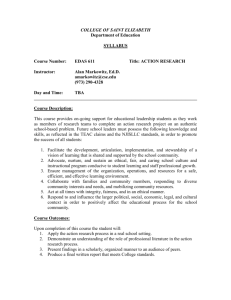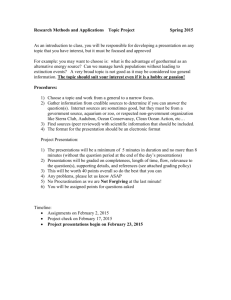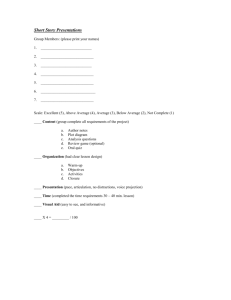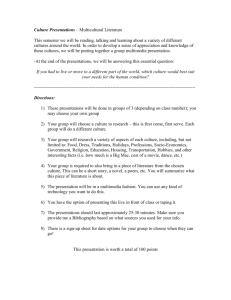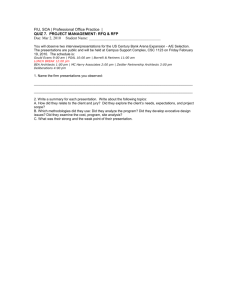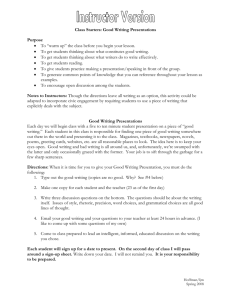Course Syllabus- Introduction to Psychology Course Descrip tion
advertisement
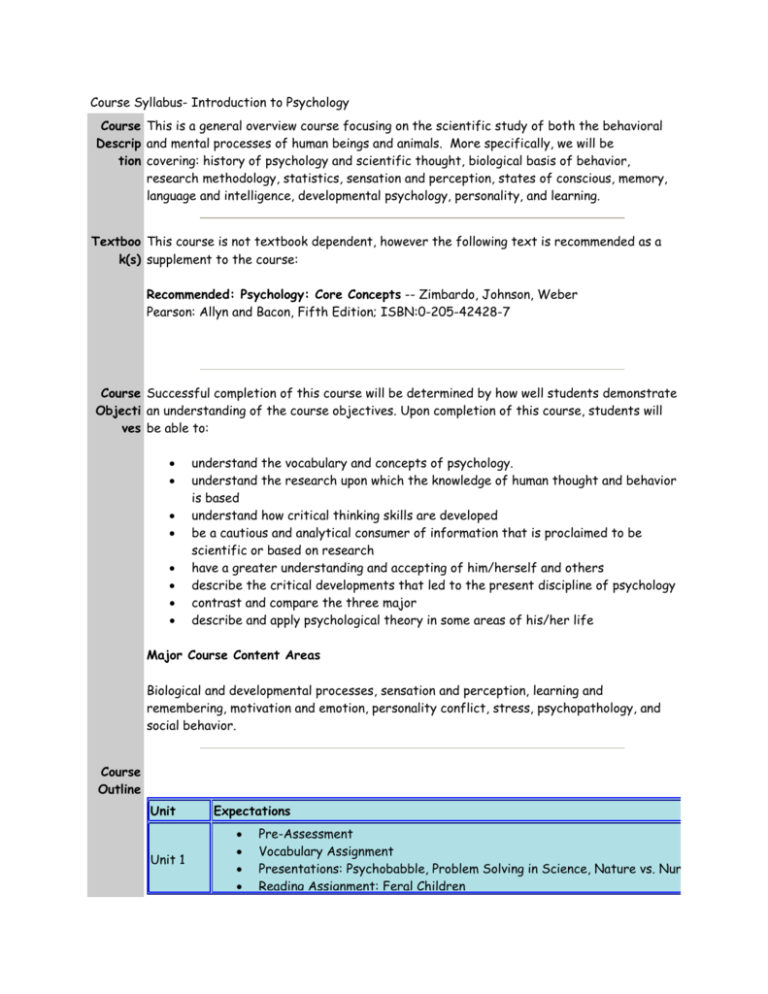
Course Syllabus- Introduction to Psychology Course This is a general overview course focusing on the scientific study of both the behavioral Descrip and mental processes of human beings and animals. More specifically, we will be tion covering: history of psychology and scientific thought, biological basis of behavior, research methodology, statistics, sensation and perception, states of conscious, memory, language and intelligence, developmental psychology, personality, and learning. Textboo This course is not textbook dependent, however the following text is recommended as a k(s) supplement to the course: Recommended: Psychology: Core Concepts -- Zimbardo, Johnson, Weber Pearson: Allyn and Bacon, Fifth Edition; ISBN:0-205-42428-7 Course Successful completion of this course will be determined by how well students demonstrate Objecti an understanding of the course objectives. Upon completion of this course, students will ves be able to: • • • • • • • • understand the vocabulary and concepts of psychology. understand the research upon which the knowledge of human thought and behavior is based understand how critical thinking skills are developed be a cautious and analytical consumer of information that is proclaimed to be scientific or based on research have a greater understanding and accepting of him/herself and others describe the critical developments that led to the present discipline of psychology contrast and compare the three major describe and apply psychological theory in some areas of his/her life Major Course Content Areas Biological and developmental processes, sensation and perception, learning and remembering, motivation and emotion, personality conflict, stress, psychopathology, and social behavior. Course Outline Unit Unit 1 Expectations • • • • Pre-Assessment Vocabulary Assignment Presentations: Psychobabble, Problem Solving in Science, Nature vs. Nur Reading Assignment: Feral Children Unit 2 Unit 3 Unit 4 Unit 5 Unit 6 Unit 7 • Discussion • • • • • • Lecture Presentations: Neural Messages, Dreams, and Sigmund Freud Video: Freud Speaks on Psychoanalysis Assignment Quiz Questions to Ponder Discussion • • • • • • Pre-Assessment Vocabulary Assignment Video: Harry Harlow on Development Reading Assignment: Rites of Passage Presentations: Erik Erikson, and Jean Piaget Discussion • • • • • • • Lecture Presentations: Illusions, B.F. Skinner, and Albert Bandura Videos: Classical Conditioning, and Bandura's Study on Aggression Assignment Quiz Questions to Ponder Discussion Midterm • • • • • • • Pre-Assessment Vocabulary Assignment Reading Assignment: Myer's-Briggs Type Indicator Presentations: Id, Ego and Superego, and Locus of Control Discussion Project Part 1 Project Part 2 • • • • • • • Lecture Presentations: Carl Jung, and Abraham Maslow Assignment Quiz Questions to Ponder Discussion Project Part 3 Project Part 4 • • Pre-Assessment Vocabulary Assignment Unit 8 Project • • • • • Reading Assignment: Vincent Van Gogh: Mentally Tortured Artist Presentations: Eating Disorders, and Phobias Discussion Project Part 5 Project Part 6 • • • • • • • • Lecture Video: The Stanford Prison Experiment, and Asch's Conformity Experiment Assignment Quiz Questions to Ponder Discussion Final Exam Project Part 7 Project Part 8 • • • • • • • • • Project Ideas Discussion Task Definition Information Seeking Strategies Location and Access Use of Information Synthesis Evaluation Project Rubric Course Course Expectations Policies and 1. Students are expected to review the assigned materials by the assigned due Procedu dates. res 2. Students are expected to actively participate in all Discussions. 3. All coursework must be typed and submitted in a Word document. 4. Students are expected to turn in quality work which, in addition to meeting content requirements, is grammatically correct and free of spelling errors. (Poor grammar and/or spelling will result in a reduction in the overall grade for the assignment. 5. Each student will prepare a 5 - 10 page term paper on a selected subject approved in collaboration with the instructor. 6. Each student will complete a multiple choice mid-term and final examination. 7. Students are encouraged to challenge the correctness of specific examination questions by stating the question number, the answer they believe is correct and specific reference to justify their answer. 8. Students will be held accountable for all information and materials presented in class. 9. Students are expected to turn in all work on the date it is due. 10. Late work will be accepted only in the case of an emergency and only if an agreement has been made previously with the instructor. 11. Any other late work will be penalized and result in a markdown of the grade for the assignment. 12. Students are expected to familiarize themselves with the National University policies on plagiarism, cheating and other academic dishonesty, as well as the penalties as found in the General Catalogue. 13. There are no opportunities for extra credit, making up classwork, etc. 14. There are no opportunities for re-examinations. 15. Grading for this course is in accordance with University policies as outlined under "Grading System" in the catalogue. General Policies Ethics: Ethical behavior is required of every student. Students are also expected to identify ethical policies and practices relevant to course topics. Technology: Students are expected to be competent in using word-processing, spreadsheets, and presentation software in this course. Use of the Internet and email is required. Academic Integrity: Ethical behavior in the classroom is required for every student. Students are also expected to identify ethical policies and practices relevant to course topics. Diversity: Learning to work with and value diversity is essential in every degree program. Students are required to act respectfully toward other students and instructors throughout the course. Students are also expected to exhibit an appreciation for multinational and gender diversity in the classroom and develop leadership skills and judgment appropriate to such diversity. Disability: National Polytechnic College of Science complies with the American Disabilities Act of 1990 and Section 504 if the Federal Rehabilitation Act of 1973. If you need accommodations due to documented disability, please contact the Vice President of Academics at (310) 816-5700. Information received by this office is confidential and is only released on the 'need-to-know' basis or with your prior written consent. Accommodations can only be granted upon approval by the Vice President of Academics. Grading Students are expected to complete all class activities, satisfactorily complete and submit Policy assignments on time, and pass all examinations. Failure to comply with these requirements will result in the loss of points and a lowering of the students overall grade. Grading Criteria Grading Criteria Mid-term and Final Exam questions will come directly from the lectures and power point presentations from within the course. Discussions will be evaluated on how well you relate the material to the posed questions. Remember purpose of the discussion is to demonstrate what you have learned and how you can apply those concepts to other situations. The Experiential Paper is another opportunity for you to demonstrate your understanding and ability to integrate the newly learned psychological terms and concepts to an applied life experience. A 90%-100% B 80%-89% C 70%-79% D 60%-69% F Below 60% Helpdes k Informa tion Technical Support is offered through Spectrum Pacific Learning Company (SPLC). Should a student need any technical assistance, he/she is to email the Help Desk as soon as possible at helpdesk@myonlinelogin.com or call 1-877-252-7715. SPLC will help resolve technical problems and walk through the solution with students. If a problem persists for more than 48 hours, the student must also notify the instructor for the course.
